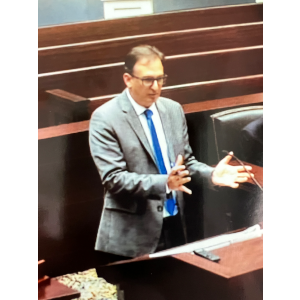Jeffrey Skatoff Successfully Resolves Trust Lawsuit Against Largest Trust Company
When is it acceptable for a corporate trustee to delegate its investment authority over the assets of an irrevocable trust to individuals with no investment experience? The answer should be “never,” and the successful resolution of a breach of trust case brought against one of the largest trust companies in the country is a cautionary tale of how not to administer a trust. The case was successfully resolved by Jeffrey Skatoff.
An executive at one of the largest retail brokerage firms in the United States passed away, leaving the bulk of his estate, comprised of stock in the brokerage firm, to an irrevocable trust. Eventually, the corporate trust department of the brokerage became the trustee of the trust. In an ill-conceived plan to reduce estate taxes, the corporate trustee contributed the stock in its corporate parent to a family limited partnership, retaining a 97% limited partnership interest in the partnership. The wife and two daughters of the deceased executive became the three general partners of the limited partnership. None of the three had any significant investment experience, and there was sufficient knowledge that the three did not get along.
The corporate trustee started in a position to be able to manage the assets of the irrevocable trust. But by transferring the assets to a limited partnership and receiving back non-controlling limited partnership interests in return, the corporate trustee lost the ability to manage the assets, and essentially delegated the control of the assets to the three individuals. Unfortunately for all involved, the 2008 stock market correction reduced the value of the nondiversified portfolio, and the three individuals were not able to diversify the portfolio until it was too late.
Although the case was litigated in Florida, New York law applied because that was where the transactions at issue took place. As argued by the beneficiaries of the trust, the corporate trustee made an improper delegation of investment authority to the three individuals when it transferred the assets to the limited partnership in exchange for the limited partnership interests.
In In re Estate of Newhoff, 435 N.Y.S.2d 632, 638 (Sur. Ct. Nassau County, 1980), the Court held that a “fiduciary may not turn over the management of the funds to the co-fiduciary and thereby escape liability.” In In re Goldstick, 581 N.Y.S.2d 165, 173 (N.Y. App. Div. 1992), the Court held:
A trustee may delegate the exercise of a trust power to a fellow trustee, especially where the latter has an expertise in some particular aspect of the trust management (citation omitted); but that does not give a trustee the right to abdicate his duty to be personally active in the administration of the trust with regard to those functions which call for consistency with usually prudent business practice.
Trustees cannot be automatically relieved of their responsibility for properly managing a trust with the excuse that their roles were merely ‘passive’ in comparison to their more active co-trustee.
As further explained:
The Prudent Investor Act requires a trustee to “diversify assets unless the trustee reasonably determines that it is in the interests of the beneficiaries not to diversify.” Id. at (b)(3)(C). While the Prudent Investor Act does permit a trustee “to delegate investment and management functions,” such a delegation must be “consistent with the duty to exercise skill, including special investment skills.” Id. at (b)(4)(C).
Under N.Y. EPTL § 11-2.3(c)(1), the delegation of an investment or management function requires a trustee to exercise care, skill and caution in:
(A) selecting a delegee suitable to exercise the delegated function, taking into account the nature and value of the assets subject to such delegation and the expertise of the delegee;
(B) establishing the scope and terms of the delegation consistent with the purposes of the governing instrument;
(C) periodically reviewing the delegee’s exercise of the delegated function and compliance with the scope and terms of the delegation; and
(D) controlling the overall cost by reason of the delegation
The 1999 Delegation was inconsistent with the corporate trustee’s duty under § 11-2.3(b)(4)(C) to exercise skill—particularly its special investment skills. Furthermore, the corporate trustee improperly delegated under § 11-2.3(c)(1) by (a) failing to select a suitable delegee, (b) failing to establish terms and scope consistent with the governing instrument, and (c) failing to review the delegee’s exercise of the delegated function.
There was one prior case decided in the country where a corporate trustee transferred assets from an irrevocable trust to a family limited partnership where the corporate trustee received back non-controlling limited partnership interests.
In re Galloway, makes clear that the corporate trustee of a marital trust (aka QTIP trust) should never participate in the formation or funding of a family limited partnership because of the inability of the trustee to maintain control over the investment assets necessary to meet its fiduciary duty to the beneficiaries. The case makes a number of relevant points:
FLP investments are rarely made in QTIP trusts. A trustee deciding whether to invest trust assets in an FLP is presented with all of the risks faced by individual investors (loss of control of assets, additional costs without guaranteed benefits, etc.). However, there are additional factors that a trustee must consider that do not affect an individual investor. That is why FLPs are even more rare in QTIP trusts, as the record in this case clearly demonstrates.
A corporate trustee’s Fiduciary considerations in creating an FLP are considerably different than those faced by an individual contemplating creation of an FLP: a corporate trustee must consider not only whether the partnership can work, but also whether the trustee is fulfilling its fiduciary duty to the trust beneficiaries.
Taking assets from a trust, particularly marketable securities, and putting them into a limited partnership where the general partner – not the trustee – is going to make the investment and distribution decisions raises a question about whether the trustee is violating its duties with respect to the administration of the trust.
Estate planners and trustees should not form an FLP solely for tax reasons. Non-tax reasons are not readily available to justify QTIP trust investments in FLPs.
(2007 Minn. Dist. LEXIS 163 (Minn. Dist. Ct. 2007) at 255-256, internal citations omitted).
The one reported case on delegation to a limited partnership in essence says that the transaction should normally not be undertaken.
The case ultimately settled by the trust company agreeing to pay a portion of the damages suffered by the beneficiaries of the trust.







